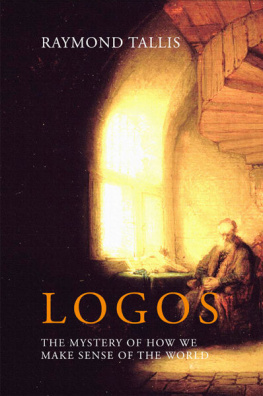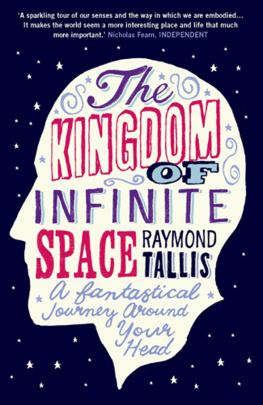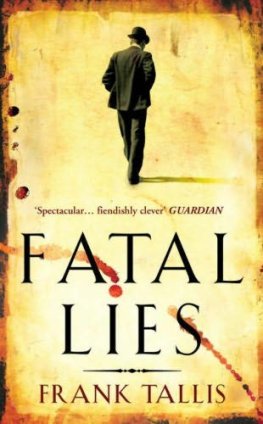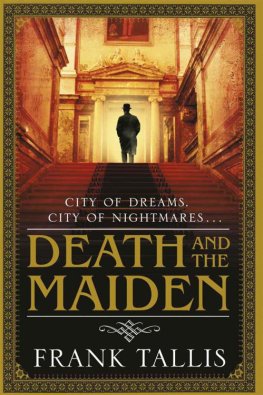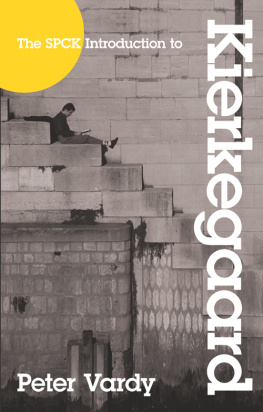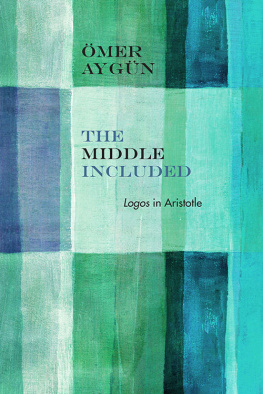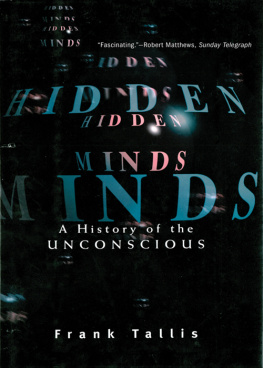Tallis - Logos: the mystery of how we make sense of the world
Here you can read online Tallis - Logos: the mystery of how we make sense of the world full text of the book (entire story) in english for free. Download pdf and epub, get meaning, cover and reviews about this ebook. City: Newcastle upon Tyne, year: 2018, publisher: Agenda Publishing, genre: Religion. Description of the work, (preface) as well as reviews are available. Best literature library LitArk.com created for fans of good reading and offers a wide selection of genres:
Romance novel
Science fiction
Adventure
Detective
Science
History
Home and family
Prose
Art
Politics
Computer
Non-fiction
Religion
Business
Children
Humor
Choose a favorite category and find really read worthwhile books. Enjoy immersion in the world of imagination, feel the emotions of the characters or learn something new for yourself, make an fascinating discovery.
Logos: the mystery of how we make sense of the world: summary, description and annotation
We offer to read an annotation, description, summary or preface (depends on what the author of the book "Logos: the mystery of how we make sense of the world" wrote himself). If you haven't found the necessary information about the book — write in the comments, we will try to find it.
Tallis: author's other books
Who wrote Logos: the mystery of how we make sense of the world? Find out the surname, the name of the author of the book and a list of all author's works by series.
Logos: the mystery of how we make sense of the world — read online for free the complete book (whole text) full work
Below is the text of the book, divided by pages. System saving the place of the last page read, allows you to conveniently read the book "Logos: the mystery of how we make sense of the world" online for free, without having to search again every time where you left off. Put a bookmark, and you can go to the page where you finished reading at any time.
Font size:
Interval:
Bookmark:
Also by Raymond Tallis and published by Agenda
Of Time and Lamentation: Reflections on Transience

copyright Raymond Tallis 2018
This book is copyright under the Berne Convention.
No reproduction without permission.
All rights reserved.
First edition published in 2018 by Agenda Publishing
Agenda Publishing Limited
The Core
Science Central
Bath Lane
Newcastle upon Tyne
NE4 5TF
www.agendapub.com
ISBN 978-1-78821-087-4
British Library Cataloguing-in-Publication Data
A catalogue record for this book is available from the British Library
Typeset by JS Typesetting Ltd, Porthcawl, Mid Glamorgan
Printed and bound in the UK by Clays Ltd, St Ives plc
For dearest Danilo and Jay who are just setting out on their journey of making sense of the world. And for their loving guides on the journey Adela and Jules, Ben and Lawrence
Contents
Acknowledgements
Yet again, I am deeply indebted to my publisher, Steven Gerrard. I am enormously grateful for his tremendous support for my writing and his scrupulous labours during the journey to the press.
Two referees Professor Sebastian Gardner of University College London and Dr Tom McClelland of University of Warwick reviewed the manuscript and made many helpful suggestions which have greatly improved the book. I am very grateful to them for their generosity. It goes without saying that any errors are my own.
Preface
[A] philosopher worthy of the name has never said more than a single thing: and even then, it is something he has tried to say, rather than actually said.
Henri Bergson, Address to the Fourth International Congress of Philosophy, Bologna, 1911
The inquiry that follows is a philosophical homecoming. At any rate, it is an attempt to return to the place whence I set out in my teens, dozens of published books, and many more dozens of unpublished manuscripts, ago.
My philosophical awakening was shaped by fears. Some were well-founded, such as that sooner or later I, and everyone I cared for, would die in pain and terror. Other fears were equally commonplace but less well-founded: that my freedom was illusory; and that the world as I experienced it might be a dream. These philosophical concerns were, a few years later, offset by something quite different: an overwhelming astonishment that I existed, that I could think that I existed; that I could make everyday sense of myself and my world; in short, that there is that. It was accompanied by an unexpected joy that I still cannot fully explain although I am grateful for it.
One moment I have recalled so frequently that not one detail will have survived undistorted. As I remember it now, I am standing in a little attic room, fragrant with cabbage soup and the fishy smell of a malfunctioning anglepoise lamp. These were my student digs: 60 Park Town Crescent, Oxford, where I was lodged with Mrs Pasternak-Slater, the exiled sister of Boris. I am talking to my friend Chris Verity, then a medical student and now a retired consultant. I cant remember what we were talking about. Suddenly I heard my own voice and, beyond my voice, the that implicit in it located somewhere between that I am, that x is the case, that the world exists and that I am making sense of something. Thus, my encounter with thatter. Mystery is, perhaps, too narrow a word; rather a revelation tinged with surprise, feeling itself to be on the threshold of a further revelation that in the subsequent fifty or more years has not revealed itself.
My career as a doctor kept me rather too much in touch with mortality, and the many limitations of freedom arising out of illness and the confusions that threatened to invade us all, as cooperation between the it is of the body and the I am of the self starts to breakdown. In my philosophical thinking, therefore, I have often focused on the joyful astonishment of realizing and accounting for the that which had filled me with such inexplicable delight, that seemed to bring me to the verge of an alternative sense of reality. It has been a presence to varying degrees on- and off-stage in many of my books. It was most obvious in The Explicit Animal (1991) and in the discussion of propositional awareness in The Knowing Animal: A Philosophical Inquiry into Knowledge and Truth (2004). But it was also a motivating force in Not Saussure: A Critique of Post-Saussurean Literary Theory (1988, 1995) and Enemies of Hope: A Critique of Contemporary Pessimism (1997, 1999) and even in my monographs on Heidegger and Parmenides.
I could trace the itinerary of this motif through the Collected Works of Raymond Tallis at great length but even authorial vanity can bore itself. The point is the centrality of the theme of That or That! to my thinking. I have been tenacious in loitering in its vicinity; and it has motivated my critique of many anti-humanist intellectual trends ranging from scientism to post-Saussurean thought. It has toyed with me for decades and has come to sit at the heart of my humanist belief in the uniqueness of human consciousness and our status as true agents, who are points of origin in the world rather than merely dissolved into external physical and cultural forces. Of a humanism, in short, that while denying our supernatural status, does not conclude, as I did in the more despairing moments of my early teens, that we must be entirely part of the natural, the material, world, helplessly subordinated to its laws.
Logos is an attempt, more direct than any of my previous books, to be true to, or to prolong, this astonishment that has, at increasingly long intervals, lit up within me. It is an endeavour to wake out of, or to, ordinary wakefulness: to discover the strangeness in the blindingly obvious.
There is something necessarily artificial, flawed, about this endeavour, not just because the pace and rhythm of writing and reading does not match that The seriousness of our lives often seems to point elsewhere and even the examined life passes for the most part free of examination. On the contrary, it is life that tends to examine us, or at least to set the questions. We are too busy being our localized selves to ascend to the uncompromised awareness of a consciousness that belongs to no-one, nowhere, and nowhen, in particular. This can make the elective astonishment of philosophy seem frivolous or artificial.
Philosophy is necessarily dialogic. While there are many interlocutors named during the course of this inquiry, there is one whose presence is more ubiquitous than is explicitly acknowledged. As I began the second attempt at this book I re-read Thomas Nagels The View from Nowhere. It is exasperating how many contemporary intellectual trends reductionist and computational theories of the mind and evolutionary epistemology to name only the most dispiriting examples have continued to flourish since Nagel demonstrated their inadequacy. That is another story. I mention Nagel here only to highlight how the passage from my open-mouthed awe to specific lines of inquiry has been influenced by The View from Nowhere.
In Logos, therefore, I have tried to return to something that feels like a fundamental or ur-thought I have been on verge of having. And if some of what follows is quite technical, the audience I have in mind is the fabled general reader. That reader is someone like myself who passes most of his conscious hours in a sub-philosophical frame of mind, even when he is philosophizing. Many philosophical thoughts, after all, are easier to discuss than to think.
The remark from Bergson at the head of this Preface which is applicable to anyone who truly struggles to philosophize is an advance warning that a thought I have never quite managed to think is still incompletely thought by the end of this inquiry. In short,
Next pageFont size:
Interval:
Bookmark:
Similar books «Logos: the mystery of how we make sense of the world»
Look at similar books to Logos: the mystery of how we make sense of the world. We have selected literature similar in name and meaning in the hope of providing readers with more options to find new, interesting, not yet read works.
Discussion, reviews of the book Logos: the mystery of how we make sense of the world and just readers' own opinions. Leave your comments, write what you think about the work, its meaning or the main characters. Specify what exactly you liked and what you didn't like, and why you think so.

